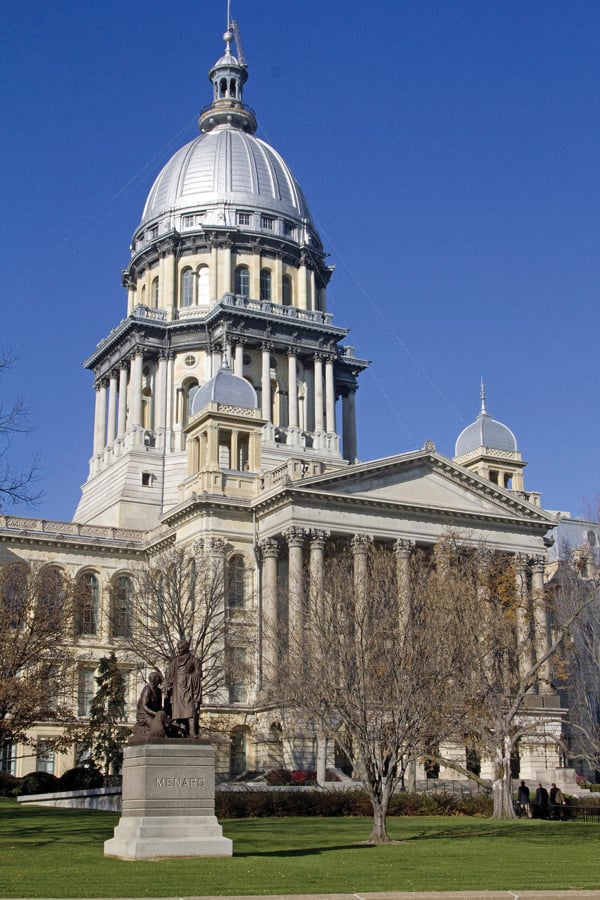Initiative for pre-enslavement black history education gains traction
Ken Ross/VW Pics/Zuma Press/TNS
The capitol building at Springfield. A bill calling for more robust black history education in public schools gained traction at the Black Caucus Annual Soiree last Wednesday.
February 25, 2020
A bill calling for more robust instruction on black history in Illinois public schools is scheduled to be updated online with new amendments and co-sponsors Tuesday. The proposed legislation gained momentum last Wednesday, the same day as the Illinois Legislative Black Caucus Foundation’s Black History Month Soiree.
The amendments added to HB 4954 would ensure that the Illinois School Code includes the pre-enslavement period in black history curriculum. The bill would also expand education to cover the entirety of the civil rights movement, emphasize a broader range of African American contributions to United States culture and facilitate accurate conversations about slavery in the country.
Meleika Gardner, a board member of Women Empowering Women in Local Legislation, led the pre-slavery education initiative, and state Rep. La Shawn Ford (D-Chicago) is sponsoring the bill in the Illinois House of Representatives, where it will soon be assigned to a committee.
The bill gained two additional House co-sponsors at the conference and is pending sponsorship by state Sen. Kimberly Lightford (D-Maywood).
Gardner said black history education typically only covers “the cotton gin, slavery, Martin Luther King and hip-hop.” She said this tendency leads Americans to misunderstand the full scope of black identity and undervalue black communities’ contributions.
“You need to know that black people, before we were enslaved, we had kingdoms,” Gardner said. “We were conquerors. We contributed medicine, technology, architecture, literature … It’s really important for black children to know where they really came from, and who they are. It will increase their own self-worth and self-value.”
The bill would shift curriculums starting at the kindergarten through third-grade level because Gardner said she hopes to affect student perspectives at an early age. Growing up, she said she saw cultural programs like Hebrew school and Greek school empowering her friends, and she always wanted to participate in a black identity-based program. Gardner said she believes the achievement gap will narrow when black children can identify with the material they learn in class.
Alexandra Eidenberg is the founder of WE WILL, an organization that helps women and children shape state legislation. Eidenberg added that the revised curriculum would teach black students’ peers to understand “that their lives don’t start in slavery.”
In a state with over 850 different school districts, Eidenberg said implementing new Illinois history curriculums could prove difficult. However, she said many curriculum writers belong to her coalition, and they are prepared to advocate for a shift away from expensive print textbooks.
In addition to local support, she said the bill is already backed by national groups like the NAACP. After the amendments go live, WE WILL plans to push for broader coalition support. The organization will call on its roughly 7,000 members to reach out to their representatives and garner more backing from elected officials.
“Because (the bill) is about black history expansion, we want to see a myriad of legislators from all walks of life, colors and religions (supporting it),” Eidenberg said. “We really want to have a diverse coalition.”
Ford said he is confident that the House and Senate will pass the bill and Gov. J.B. Pritzker will sign it into law. He said the bill has generated strong community support because it is “the right thing to do.”
As well as underscoring the importance of teaching pre-enslavement history, Ford emphasized a need to depict slavery as a violent time in history. He said too often curriculum glosses over the topic or fails to portray it in the correct light.
“My goal is to make sure that everyone … knows the true history of blacks in this country,” Ford said. “It’s up to the states to do that. As a State Representative, I’m happy to work with WE WILL and a few other groups to make sure that Illinois leads the way in making sure that black history is taught accurately in schools.”
Gardner said she feels that a stronger sense of history and knowledge of self could have alleviated a lot of the pain and suffering she has observed in people close to her.
She said her involvement in legislation stems from her love and care for others, especially for black youth, and from her desire to affect large-scale change.
“I’m really hoping that this bill passes,” Gardner said. “I think it’ll change some lives, and it’ll save some lives, and it’ll make our youth realize just how powerful our history really is.”
Email: maiaspoto2023@u.northwestern.edu
Twitter: @maia_spoto



